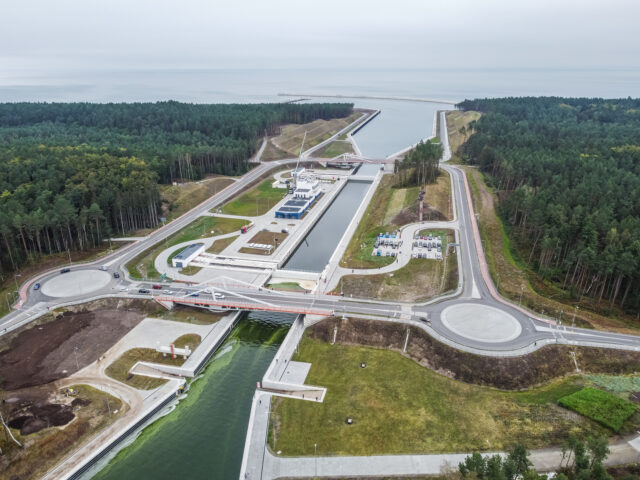WARSAW, Poland (AP) – Poland’s top leaders celebrated the opening Saturday of a new – albeit unfinished – canal that they say will mean ships no longer must secure Russia’s permission to sail from the Baltic Sea to the ports of the Vistula Lagoon.
The event was timed to mark 83 years since the Soviet invasion of Poland during World War II and to demonstrate symbolically the end of Moscow’s say on the economy and development of a region that borders Russia’s Kaliningrad exclave. The government says the waterway gives Poland full sovereignty in the northeastern region, which needs investment and economic development.
“The idea was to have this waterway opened and not to have to ask permission anymore from a country that is not friendly and whose authorities do not hesitate to attack and subdue others,” Polish President Andrzej Duda said.
He said the investment will pay off through the increase in the value of the land around it, through the development of the cities and ports on the lagoon thanks to increased trade, business and tourism.
A few thousand people with national white-and-red flags gathered in rain to watch the Zodiak II technical ship pass through the water gates to inaugurate the canal. The national anthem was played and ships sounded their horns.
Small ships and yachts are expected to be allowed in on Sunday.
The leader of Poland’s right-wing ruling party, Jaroslaw Kaczynski, told the crowd this is “the start of Poland’s fourth big port (Elblag) and a new impulse for the development of this land” that will cut unemployment, which is among Poland’s highest levels now at 7.6 per cent.
Kaczynski stressed the construction of the canal shows that “Poland is a truly independent, sovereign and strong nation that matters. ”
The canal, built at a cost of almost 2 billion zlotys ($420 million), cuts across the Vistula Spit, east of Gdansk, to allow ships to sail from the Baltic Sea and the Bay of Gdansk to Elblag and smaller ports of the lagoon without obtaining authorization to travel through Russia’s Strait of Pilawa. It also shortens the Baltic-to-Elblag route by some 100 kilometers (54 nautical miles).
However, cargo ships cannot use the passage until the approach to the Port of Elblag is deepened to 5 meters (16 feet). The work is expected to cost 100 million zlotys ($21 million), which is a source of controversy between the national government and city authorities.

COMMENTS
Please let us know if you're having issues with commenting.